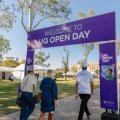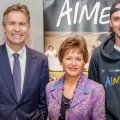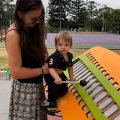Director of independent, grass-roots community advocacy organisation GetUp! Simon Sheikh will visit The University of Queensland as the keynote speaker in a free, half-day public symposium on ‘Listening to the Quietest Voices’ on Wednesday October 19.
The symposium, which runs from 9.00am-12.30pm, is hosted by the UQ School of Journalism and Communication’s Centre for Communication and Social Change to celebrate the 2011 Communication for Social Change Awards.
Mr Sheikh will be joined by some of Australia’s foremost actors and thinkers in the social justice arena to discuss, debate and share their strategies for a more inclusive Australia.
Following the keynote speech, Mr Sheikh will join Margaret Reynolds, former Minister for Local Government Regional Development and disability advocate, and representatives from Amnesty International Australia, Reconciliation Australia and UQ in a panel discussion about how communication processes, technologies and media can be used to facilitate an Australia where even the ‘quietest voices’ are heard.
Attendees will also get the opportunity to join one of two parallel sessions run by the 2011 Communication for Social Change Award winners. Mr Freddy Mata Matundu, from the Democratic Republic of the Congo, will facilitate a workshop on participatory theatre, and Mr Dipak Naker, co-director of Ugandan organisation Raising Voices will present the work of his organisation in prevention of violence against children.
100 places are available but RSVPs are required to secure a position. A light lunch will be provided.
Date: Wednesday, 19 October, 9.00am-12.30pm
Location: Cromwell College, Walcott Street, St Lucia
Cost: Free
RSVP: ccsc@uq.edu.au – limited seats available.
For more information, please visit www.uq.edu.au/ccsc/
Speakers
Simon Sheikh became the National Director of GetUp! at just 24 years of age. He was also one of the youngest attendees at the Australia 2020 summit. Prior to joining GetUp! Simon represented Australia at the Commonwealth Heads of Government meeting in Uganda in 2007 as Australia's Commonwealth youth representative and in the same year was named the NSW Young Professional of the Year. Simon is passionate about electoral reform and has worked on issues like the release of David Hicks and Australia’s Anti-Terrorism laws. He is also a climate change activist.
Margaret Reynolds will draw on her experience as the first woman to represent the Australian Labor Party as Senator for Queensland, as well as her appointments as the Australian Government Representative on the Council for Aboriginal Reconciliation 1991-1996, Chair of the Commonwealth Human Rights Initiative 1993-2004 and National President of the United Nations Association of Australia 1999-2005. Since leaving the Australian Parliament in 1999 Margaret has lectured in human rights and international relations and worked with UNIFEM to develop citizenship and good governance programs for women and young people. She has actively pursued recognition of Australia’s international obligations to protect the rights of asylum seekers and presented three reports against arbitrary detention to the U.N Human Rights Commission in Geneva. Margaret is currently State Manager for National Disability Services in Hobart.
Grant Paulson is a Group Manager with Reconciliation Australia, overseeing the Indigenous Engagement Strategy. This strategy seeks to strengthen the impact of Reconciliation Australia’s projects and programs through more creative relationships with Aboriginal and Torres Strait Islander peoples, communities and organisations. Prior to this, Grant worked as an advisor to higher education institutions, corporations, not-for-profit organisations in the community sector, and state reconciliation groups engaged in the Reconciliation Action Plan (RAP) program. Grant has also worked as Reconciliation Australia's National Youth Programs Coordinator.
Tracey Fowley began working with Amnesty International in 2010 as the Community Campaigner for Queensland and Northern New South Wales. She has been involved with the organisation for many years prior, as a university intern and as a volunteer group convenor. Prior to working for Amnesty International she held a range of roles including project officer with the Federal Government.
Freddy Mata Matundu is the individual winner of the 2011 Communication for Social Change Award for his work with an innovative, community-based initiative that uses participatory theatre and film to create acceptance of deaf, mute and hearing impaired people in the Democratic Republic of Congo, and promote peer-to-peer learning within these communities.
Dipak Naker is the co-founder of Raising Voices, the organisation winner of the 2011 Communication for Social Change Award. Raising Voices is based in Uganda and works to prevent violence against women and children in sub-Saharan Africa. It works to create practical methodologies that enable communities to take action.
.jpg)








